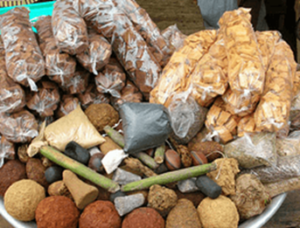Ghana media told to authenticate herbal medicines before advertising
 Dr Kofi Donkor, Head of Research and Innovation at the Center for Plant and Medical Research has called for the strengthening of regulations on herbal medicine in both traditional and social media outlets.
Dr Kofi Donkor, Head of Research and Innovation at the Center for Plant and Medical Research has called for the strengthening of regulations on herbal medicine in both traditional and social media outlets.
This must be implemented to purge the media of the proliferation of advertisements for fake herbal medications to ensure those remedies are safe for consumption.
“Before you advertise a herbal medicine, you need to ensure that the advert has been approved by the Food and Drugs Authority (FDA), also demand from the producers of the medicine, a license which proves that the medicine you are about to advertise is duly tested, approved and registered by the FDA,” he said.
Speaking at a public forum on an expose of ‘Herbal Medicine Advertising in Ghana’ Dr Donkor, urged the media to be vigilant when endorsing advertorials for herbal medicines.
The investigative report by The Fourth Estate, a project of the Media Foundation for West Africa, discovered that some media houses in Ghana advertised herbal medicines without the approval of the regulatory body.
The report revealed that eight leading media houses in four regions in Ghana promoted a fake and non-existent herbal product without seeing the product or asking about its approval by the FDA.
They did not also ask about the FDA’s mandatory approval of the contents of the adverts, exposing consumers to harmful drugs with exaggerated claims.
The report showed that regulators who were expected to ensure that herbal medicines were certified and approved before advertisements were not doing the necessary monitoring to identify these wrongdoings.
Herbal medicine plays an integral role in healthcare delivery in Ghana.
According to the World Health Organisation (WHO), about 80 per cent of the population in developing countries, including Ghana, rely on herbal medicine to treat various ailments.
In Ghana, the Traditional Medicine Practice Council (TMPC) and the Food and Drugs Authority (FDA) are the two main regulators in charge of herbal medicine standardization in Ghana.
There are however perceived lapses in the regulation leading to the proliferation of fake and unregistered products in the market.
The media, which is the main platform through which herbal medicine advertisers reach their audience, have shirked their gatekeeping role.
Research by the University of Ghana revealed the media, especially radio stations use their platform to make exaggerated and false claims about the effectiveness of herbal medicine products.
The media in Ghana has also been noted to continuously promote and validate fake herbal medicines.
A Deputy Minister of Health, Alhaji Mahama Asei Seini, said the ministry would work closely with herbal medicine manufacturers to ensure that they followed best practices in the licensing, regulation, and standardization of herbal medicines.
“In recent times, there have been many misleading advertisements for herbal medicines in Ghana, this is rather a dangerous trend that could lead people to use products that are unsafe and detrimental to their health, a situation that could even result in death,” he said.
Alhaji Seini said the government had taken a keen interest in the documentary and would launch an immediate investigation into key revelations of the documentary to ascertain which of the staff members at the Traditional Medicine Practice Council failed to do due diligence, in the licensing of a fake herbal medicine manufacturing company.
Source: GNA
